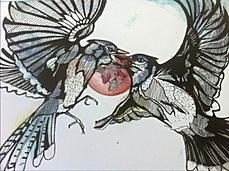Marc Woodward is a musician, which is tangible in A Fright of Jays. With controlled rhythm and sense of pacing, many of the pieces here carry you along with them. There are stories of moonlight and wildlife in the strange, small wildernesses of the South West. In its strongest passages, the relationship with the landscape is both brutal and beautiful – hints of the sublime and the realistic one finds in Jack Clemo or Ted Hughes. The proliferation of foxes, owls and rabbits clearly marks a sympathy with the latter, as does the unflinching description of finishing off a life in ‘Eel Catching’.
The convincingness of the stories is greatest when they are simplest. The myth of ‘The Bowman’s Lament’ is full of memorable images – ‘The air stepped sideways, / shivering at the brush of fletching as the shaft / flew past and rush on up to the white moon’. The sustained, precise gentleness of ‘Revival’, about saving a lizard ‘stunned to stupor by the late March chill’ is remarkable. It’s also no coincidence that these poems are the most formally controlled (both sonnets), avoiding the occasional bagginess of some longer pieces.
‘Beyond Broadwoodwidger’, for example, is spooky and physical, capturing the chill of being stranded in deep countryside at night. So easily lost ‘on these shapeless acres’, the night encloses you, soft and inescapable: ‘You hear the weight of condensation / on a vast ocean of bending blades’. The beautiful sensory wash of the poem is undercut a little by its more overtly dramatic gestures, which reach for bigger effects than the poem needs; restraint produces the more genuine images. Contrast, in ‘Beyond Broadwoodwidger’, the stretch of ‘Here there is nothing to save you. / If you lie down now, this wet ditch / may be your decomposing place’ in this poem with the tenderness of the ending of ‘Revival’: ‘I felt her move, / faintly, as she responded to the heat’.
My favourites in this collection make the poet palpably ‘present’, speaking quietly and directly. The most effective is ‘The Nightshades at the Church House Inn’, which opens with a group of musicians grabbing a smoke between sets – ‘I’m here not for the nicotine / but the camaraderie. / The cupped hands, click of lighters, / the lighting off from one another:’ This is the least rhythmically orderly poem – the musician taking a break? – but is also unselfconscious and full of details. Like all these poems, it’s great to read aloud, but here we get closest to the poet’s natural voice, it seems. The final lines highlight the best parts of the collection. They most clearly reveal the poet as quietly contrarian observer, letting the weight of the exact word do the work: ‘I pick up my mandolin – a warm brown shade: / ‘Cremona’ if it was a fiddle. ‘Tobacco’ mandolinists say.’
Mike Rose-Steel is editor for Spindlebox press, and founded the Exegesis writing collective. He researches on Wittgenstein and poetics. Recent poetry collections include Paraphernalium and Drawing Over is Drawing Under.
Order your copy of Marc Woodward’s chapbook A Fright of Jays, published Maquette Press, here

